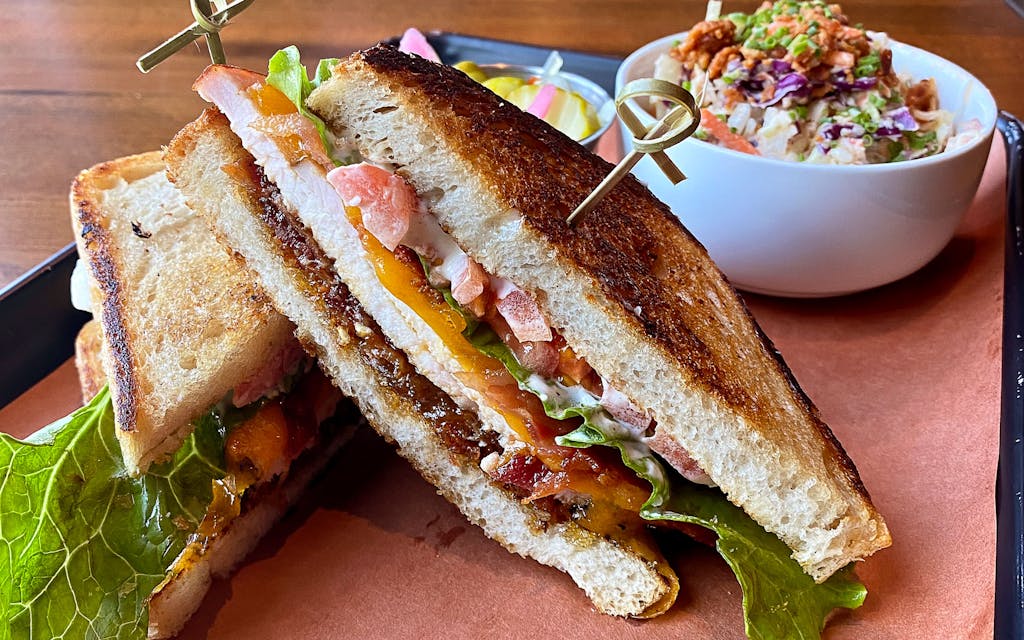It was early September when Doug Pickering started stockpiling turkey breasts in the freezer at the Douglas in Dallas. He had seen reports of avian flu in the news and had heard from his food supplier about a turkey shortage. He decided the $5.50-per-pound price (compared with $3.20 when the Douglas opened in May) was still low enough to keep one of the restaurant’s most popular items on the menu. The shortage was supposed to be brief, but a month later he’s still getting only a couple cases in his weekly order of boneless, skinless turkey breasts instead of the ten he requests. After placing a preorder for eighty whole, fresh turkeys for anticipated Thanksgiving orders, Pickering is keeping his fingers crossed until they arrive. “I don’t know if I’m going to get any at all,” he said.
Bird flu, or, more specifically, highly pathogenic avian influenza (HPAI), has spread to poultry flocks in 42 states this year, according to the CDC. It was first detected in January, and over the next six months 5.4 million turkeys on infected farms were destroyed (or “depopulated,” in the USDA’s language) in an attempt to stop the spread of the disease. That represents 2.5 percent of the total number of turkeys processed in all of 2021—a staggering number of birds, but the infections persisted. Scientists are surprised that the HPAI outbreak persisted through the summer because warm weather has stymied the virus in the past. Food Dive reported last month that over half a million more turkeys have been culled since July, and major turkey producer Hormel Foods has warned that supplies in the fourth quarter could be down by 30 percent. That means a tight market when Thanksgiving arrives.
“I don’t expect to come out of this until March or April,” Kevin Karcher told me. He manages the poultry accounts for many Texas barbecue joints for food supplier Ben E. Keith. He’s speaking more specifically about the supply of boneless, skinless turkey breasts that are seen on barbecue menus around the state. Grocery stores and national sandwich chains take up most of what’s available. For his restaurant customers, Karcher orders turkey breasts by the truckload, meaning two thousand cases at a time. Lately, only two to four hundred cases arrive with each order. “[Producers are] going to try to honor those national contracts first,” Karcher said. He did mention a bright spot in the poultry market: chicken prices have lowered to nearly pre-COVID levels.
Brandon Hurtado owns three barbecue joints in North Texas. He opened the doors of his Fort Worth location of Hurtado Barbecue just two weeks ago but without turkey on the menu. “We are ordering chicken quarters as a substitute,” he said. He made the decision three weeks ago when he saw that turkey was going to cost him more than $6 per pound. “I just can’t justify paying that for turkey when brisket is nearly half the price,” Hurtado said.

When Arnis Robbins saw the price for whole turkeys last month, he decided that Evie Mae’s Pit Barbeque in Wolfforth wouldn’t bother selling smoked whole turkeys this Thanksgiving. He was offered only twenty-pound birds, and at the price he’d have to pay, the whole turkeys would need to sell for $150 apiece to make a profit. Easing the usual Thanksgiving burden on the employees at Evie Mae’s seemed like a better choice than switching to another protein special for the holiday. “Brisket doesn’t hit the same on the Thanksgiving table,” Robbins said. As for the usual turkey breast orders, he’s getting shorted a few cases every week and paying 150 percent of his usual cost for the ones that do arrive.
“We had a stockpile of turkey in our freezer meant for caterings, but our freezer went out on us,” Ernest Servantes of Burnt Bean Co. in Seguin told me. He had been thawing and smoking a few for the restaurant every day but was forced to cook all the thawed turkeys within a few days. Until the price of turkeys comes down, he’s cooking more pork shoulders for pulled pork. “I don’t think we’re going to run [turkey] for the rest of the year,” he said. I heard the same sentiment from joints including Ernie’s Pit Barbeque, in Greenville, which has stopped serving turkey, and Local Craft BBQ, in Newark, which switched to chicken halves and chicken breasts. Helberg Barbecue in Waco stopped offering its popular herb-stuffed turkey breasts two weeks ago and has recently added smoked chicken thighs with the same seasoning. Russell Roegels is biting the bullet and paying $6.77 per pound for turkey at the Houston and Katy locations of Roegels Barbecue Co.
Chickens can mature to slaughtering weight in as quickly as 10 weeks after an egg is laid, but it takes turkeys 24 weeks to reach maturity. The population can’t bounce back quickly. Still, with the worst of the HPAI outbreak perhaps behind us, turkeys hatched in July will be ready for Thanksgiving tables. That matters little to Servantes, Hurtado and other pitmasters. “We’re a ham household anyways,” Hurtado said. “My mom serves beef tenderloin,” Karcher said. While Robbins hasn’t settled on a protein for the center of his family’s Thanksgiving table, he’s thinking a smoked prime rib sounds like a good possibility. If you’re still set on turkey for the holidays, shop early, get a frozen one, and expect to pay more for it, whether or not you’re able to get it from your local barbecue joint.
- More About:
- Seguin
- Houston
- Fort Worth
- Dallas








